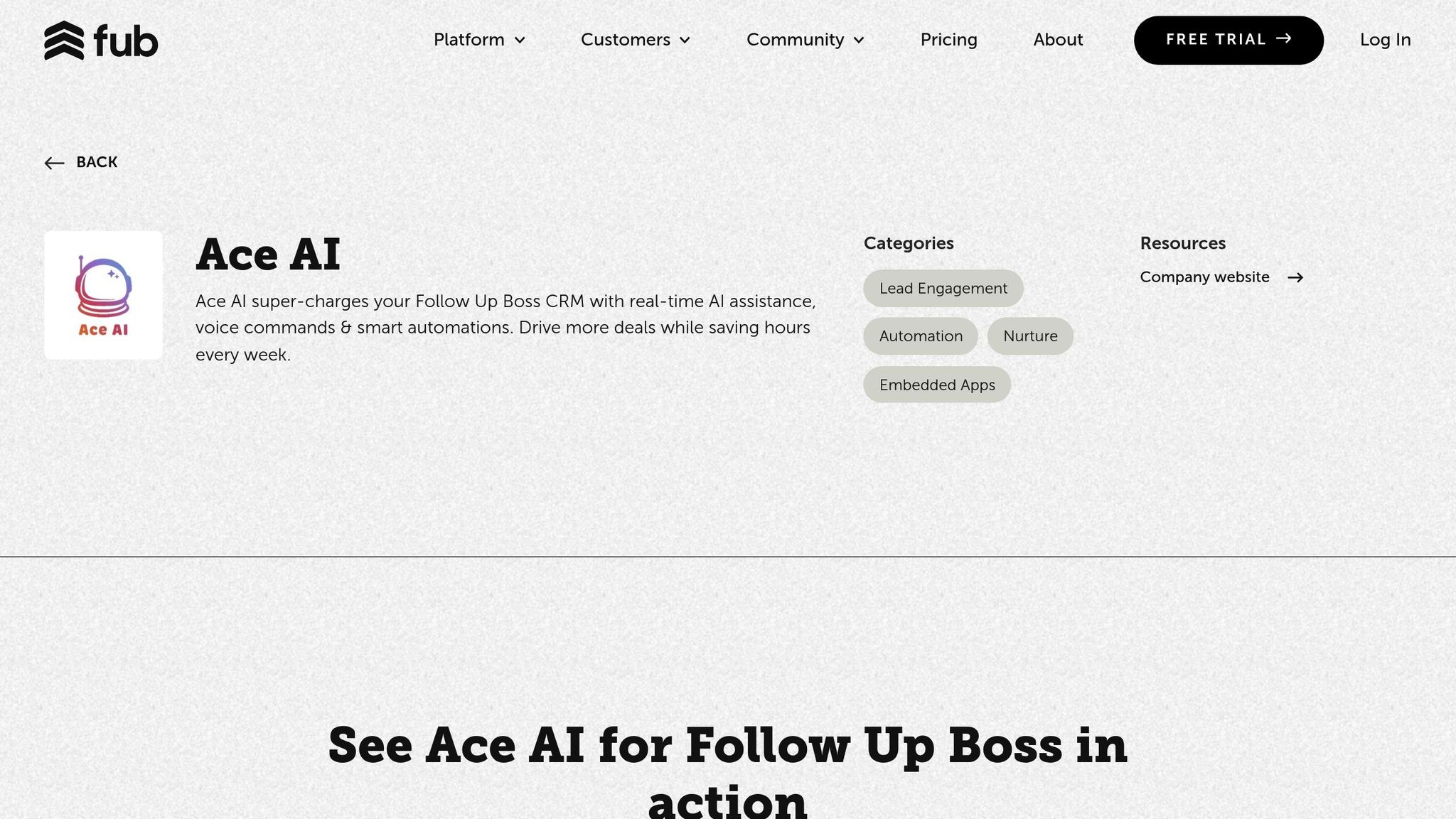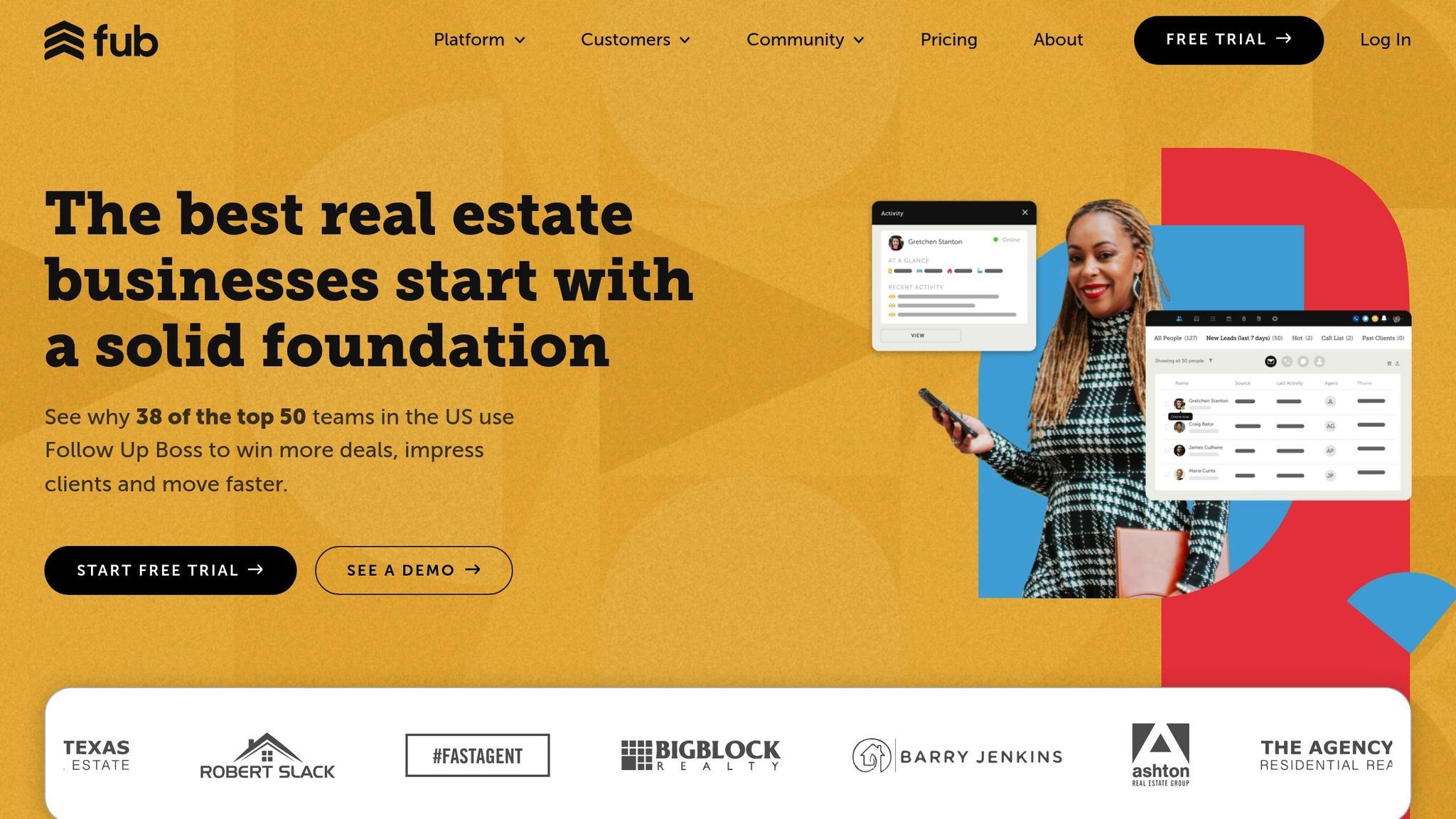Follow Up Boss Document Sharing Tips
Managing real estate documents can be messy - but it doesn’t have to be. Follow Up Boss offers tools to simplify document sharing, helping agents stay organized, collaborate easily, and close deals faster. Here’s what you need to know:
- Centralized File Management: Attach and store documents directly in client profiles within the CRM.
- Collaboration Features: Share files with team members and clients securely, with controlled access.
- Google Docs Integration: Work on files in familiar formats while keeping everything synced.
- Automation Tools: Automatically share documents based on transaction stages.
- Compliance Support: Track access, manage versions, and set retention policies to meet legal standards.
Pro tip: Use consistent file naming (e.g., Smith_456OakSt_PurchaseAgreement_2023-10-15.pdf) and folder structures to save time and avoid confusion.
Follow Up Boss’s document-sharing features are designed to streamline workflows, improve team communication, and keep clients happy. Whether you’re managing contracts, disclosures, or inspection reports, these tools make it easy to stay on top of your transactions.
Setting Up an Effective Document Sharing System
Building an organized document-sharing system in Follow Up Boss is all about finding the sweet spot between structure and simplicity. The idea is to create a system that allows your team to locate files without wasting time or effort.
Organizing Files with Folder Structures and Naming Conventions
The backbone of effective document management lies in having a straightforward folder structure that mirrors your workflow. Overcomplicating this process can backfire - complex systems often become too cumbersome to use and are eventually abandoned. Instead, aim for a setup that boosts productivity while keeping things simple.
A good starting point is a two-tier folder structure that separates permanent files from active projects. In Follow Up Boss, this could mean organizing files by client profiles and transaction stages. Create main folders for broad categories of documents and limit the use of subfolders.
For instance, instead of making individual folders for every document type, group related documents under broader categories like "Contracts", "Disclosures", and "Financial Documents." If you're managing a high volume of date-sensitive files, consider sorting them into annual, quarterly, or monthly folders. For many real estate teams, a quarterly setup strikes the right balance between accessibility and structure.
Another helpful tool is a tagging system. By tagging documents in Follow Up Boss, you can make files easier to locate without relying on memory to navigate folder paths.
When it comes to naming files, consistency is key. A clear and uniform naming convention can save your team a lot of headaches. ListedKit suggests using a format like:
[ClientLastName_PropertyAddress_DocumentType_Date]. For example:
Smith_456OakSt_PurchaseAgreement_2023-10-15.pdf
To keep everyone on the same page, create a team-wide style guide for filenames. This should cover abbreviations, date formats, and how to handle special cases like amended contracts or supplemental documents. Consistent naming makes it easy for anyone to identify and retrieve files, no matter who uploaded them.
Once your folder structure and naming conventions are in place, the next challenge is managing file versions effectively.
Managing File Versions and Updates
Version control is crucial when multiple team members are working on the same document or when contracts are updated. According to research, 91% of professionals say their job would be easier if they could quickly identify the latest version of a document. Meanwhile, 33% have experienced versioning issues that led to duplicate work or compliance problems.
If your document management platform offers automated version control, take full advantage of it. These features can track changes and let you recover earlier versions without any manual effort. For platforms without automated tools, you can implement manual tracking by adding revision details to filenames. Use indicators like REV01 and include date stamps to keep versions in chronological order. For example:
- Smith_456OakSt_PurchaseAgreement_2023-10-15.pdf
- Smith_456OakSt_PurchaseAgreement_2023-10-15_REV01.pdf
- Smith_456OakSt_PurchaseAgreement_2023-10-18_REV02.pdf
If multiple revisions are made on the same day, consider adding time stamps or sequential numbers for added clarity.
To avoid confusion, maintain a master list of all documents for each transaction. This index should be updated whenever new versions are uploaded or documents are finalized. It provides a quick reference and ensures no one accidentally works on an outdated file.
Establish clear guidelines for when to create a new version versus updating an existing file. For major changes, like contract amendments or price updates, create a new version. For minor edits, such as correcting typos or formatting issues, simply update the existing file.
Sharing Documents Securely and Efficiently
Once your files are organized, the next step is sharing them securely while maintaining control over access. It's essential to incorporate strong security measures to protect sensitive client information. Follow Up Boss offers advanced security tools to ensure your documents are shared safely, keeping confidential data out of harm's way. Additionally, fine-tune access with detailed permission settings to ensure the right people have the right access.
Setting Access Permissions for Clients and Team Members
Follow Up Boss employs HTTPS and 256-bit encryption to safeguard connections, along with continuous monitoring and daily data backups to enhance security. This ensures a reliable and secure environment for sharing documents.
You can assign specific user roles to manage team member access effectively. When working with integration partners, the platform gives you full control over which services can access your data. You can also revoke access at any time if it's no longer required.
For secure collaboration with lending partners and agents, Follow Up Boss integrates with Leaf360, enabling one-click, encrypted communication. Strengthen account protection by enabling two-factor authentication, verifying accounts, and restricting access from unfamiliar locations.
Instead of using email attachments, opt for secure shareable links to monitor client engagement. Follow Up Boss avoids allowing attachments in marketing emails to comply with email standards, improve delivery rates, and enable link tracking. This gives you valuable insights into how clients interact with your emails.
For documents that need limited-time access, expiring links are a practical solution.
Using Expiring Links for Time-Sensitive Documents
Although Follow Up Boss doesn’t have built-in support for expiring links, third-party integrations can help you create time-limited access. Platforms like Google Drive, Dropbox, or your website allow you to generate view-only shareable links. Adjust the settings to "view only" to prevent edits, and then include the link in your Follow Up Boss email instead of attaching the document.
For automated expiring links, tools like Linkly via Zapier can be integrated. This is particularly helpful for documents that quickly become outdated, such as inspection reports, loan pre-approval letters, or contract amendments. For instance, you might set a 30-day expiration for inspection reports but limit contract amendments to a 7-day window. This approach ensures that sensitive documents remain accessible only for the necessary duration, reducing the risk of unauthorized access or outdated information being used.
Improving Document Sharing with Automation and AI
Automation takes the hassle out of document sharing, cutting documentation time by over 70% while improving accuracy and client satisfaction. In real estate, about 80% of paperwork is repetitive, with only small variations from past transactions. By integrating automation and AI into Follow Up Boss, you can significantly lighten this workload while ensuring better precision and happier clients.
Automating Document Sharing Based on Workflow Stages
Follow Up Boss allows you to set up workflows that automatically send documents at key points in the transaction process. For example, listing agreements can be shared when a lead schedules an appointment, or closing documents can be sent as soon as a deal moves "under contract." These workflows rely on real-time data from your CRM to ensure everything runs smoothly.
Beyond just timing, these workflows can also identify missing details and fill them in, minimizing back-and-forth communication with clients. This keeps the process moving efficiently and ensures that clients receive exactly what they need at the right time. Plus, state-specific templates are always up-to-date, helping you stay compliant while managing multiple transactions with ease.
Using Ace AI for Smarter Document Management

Ace AI takes automation to the next level by integrating seamlessly with Follow Up Boss. Using voice commands and context-aware assistance, Ace AI suggests and sends the most relevant documents for each interaction. Designed specifically for Follow Up Boss users, Ace AI adapts to your CRM structure, workflows, and communication habits, offering tailored support.
Ace AI analyzes client interactions - like notes, calls, texts, and even website activity - to recommend the right documents at the right time. For instance, during a buyer consultation, it might suggest sharing pre-approval worksheets or buyer guides based on the client’s stage in the process and prior communications. This intelligent integration strengthens your automated document-sharing system, creating a seamless and intuitive workflow.
Smart attachment suggestions from Ace AI ensure you never overlook critical documents. By analyzing your templates and understanding your team’s preferred practices, the AI offers intelligent recommendations for client communication. Setting it up is simple through the admin dashboard, where you can customize team branding, fine-tune assistant settings, and enable access for your team.
With 72% of organizations expected to use AI in at least one business function by 2024, real estate professionals who adopt tools like these gain a strong edge. Combining Follow Up Boss’s CRM features with Ace AI’s intelligent automation creates a system that simplifies document management while maintaining the personal connection clients value most.
Ensuring Compliance and Audit Readiness
When it comes to document sharing, compliance isn't just a box to check - it's a critical component of maintaining security and ensuring smooth operations. Regulatory scrutiny demands that businesses adopt practices aligned with industry standards and privacy laws. While Follow Up Boss provides strong security features, it's up to users to implement procedures that meet these requirements.
Tracking Document Access and Consent
A key aspect of compliance in document sharing is obtaining and documenting client consent. Follow Up Boss requires users to secure consent from their customers before utilizing its services, including communications with those customers. Make sure to clearly record when clients agree to receive documents electronically and maintain those records for future reference.
Although Follow Up Boss tracks email link clicks, it doesn't monitor attachment downloads. To create a reliable audit trail, consider including shareable text or image links in emails, which can help you track user interactions while ensuring compliance.
Follow Up Boss adheres to major security standards like SOC 2 Type 2, SOC 3, CCPA, CASA Tier 2, and PCI. It also prioritizes data privacy by giving you control over which integration partners can access customer data. However, you're responsible for handling opt-out requests from customers, including maintaining an internal "do not call" list.
"We are proud to say that we successfully complete annual Google security audits along with other independent security audits which confirms our high standards for handling user data." – Follow Up Boss
Laws like GDPR and CCPA require that you document client consent, including the specifics of what they agreed to and any subsequent changes. While Follow Up Boss provides tools to manage data access, you must establish clear processes for collecting and maintaining customer data to stay compliant.
Once you've documented access and consent, it's equally important to set clear retention guidelines to further strengthen compliance efforts.
Setting Retention Policies for Document Storage
Retention requirements for documents vary widely by state. For instance, most state real estate commissions mandate keeping transaction files for at least 3–5 years. Brokers, in particular, are required to maintain records such as contracts and listing agreements for a minimum of three years, ensuring they are readily accessible for examination.
Follow Up Boss supports compliance with continuous data backups (every second) for 35 days and daily backups stored for up to one year via a separate provider. However, these technical safeguards should complement your own retention policies.
For tax-related documents, the IRS generally recommends keeping records for three to seven years, though some professionals advise retaining them for at least seven years. When crafting your retention policies, consult legal counsel to ensure adherence to both state-specific regulations and broader legal standards. Offices and associations should create tailored policies that align with employment and licensing requirements.
An effective retention policy does more than meet legal obligations - it reduces risks and can save costs associated with audits or legal disputes. To develop a strong policy, focus on these steps: understand the relevant regulations, categorize records appropriately, set clear retention periods, organize records systematically, and review policies periodically. A legal expert should also review your policy to cover areas like employment, tax, and state licensing laws.
Follow Up Boss retains customer data, including end customer information, for as long as necessary to comply with applicable laws and its own policies. With a track record of 99.95% system uptime and over 5 million leads processed since 2011 by more than 20,000 real estate agents, the platform has proven its reliability for long-term document storage.
For a balanced approach, consider hybrid strategies that combine physical copies with digital backups. Follow Up Boss's secure cloud storage ensures instant remote access, while physical documentation can help meet state-specific requirements. Together, these methods provide a comprehensive way to stay compliant and prepared.
sbb-itb-b3b90a6
Conclusion: Streamline Your Workflow with Follow Up Boss Document Sharing

Efficient document sharing transforms disorganized files into a centralized, accessible system that keeps your team on the same page and your clients well-informed. Follow Up Boss's document sharing features provide secure storage, controlled access, and collaboration tools designed to make teamwork easier.
The platform’s user-friendly design ensures your team can quickly adapt. As Keeli N., Director of Operations in Real Estate, shares:
"FUB has a much cleaner user interface and is extremely easy to navigate"
This simplicity extends to its document management features, enabling smoother workflows. By using clear folder structures and consistent naming conventions, paired with Follow Up Boss's Smart Lists and Action Plans, you can integrate document sharing into a system that keeps every transaction detail in focus. With an impressive 4.5/5 rating for ease of use, the platform is built to support your team’s success.
For those looking to save even more time, the Ace AI integration takes efficiency to the next level. It automates document sharing through voice and chat commands, ensuring the right files are sent to the right people at the perfect moment. This AI assistant, exclusive to Follow Up Boss, also provides automated lead summaries and actionable next steps.
Clear retention policies and access tracking make compliance straightforward, while the platform’s secure infrastructure ensures reliable record-keeping. Real estate professionals using Follow Up Boss often report better team coordination and improved client service. Research shows that 74% of CRM users experience enhanced access to customer data, enabling more personalized interactions. With seamless document sharing, contracts are finalized faster, clients remain informed, and deals close more efficiently.
Combining Follow Up Boss's document sharing tools with features like Ace AI gives you a competitive edge. It’s more than just file storage - it’s a scalable system that safeguards your data, streamlines operations, and keeps your team productive, whether they’re in the office or working remotely.
"Follow up Boss has created simplicity in sales and operations. If you are not using a CRM, you are losing money and you need to get FUB today!" – Anthony D
FAQs
How can I keep document naming consistent for my team in Follow Up Boss?
To keep document naming consistent across your team in Follow Up Boss, create a straightforward naming system that everyone can easily stick to. A good example might be including the client’s name, the type of transaction, and the date in each file name (e.g., Smith_Buy_2023-10-15). Make sure to share these guidelines with your team and keep them readily available for reference.
It’s also important to remind your team regularly why sticking to this system matters - it prevents confusion and makes it easier to find files when you need them. Consider scheduling occasional check-ins to ensure everyone is on track and to tweak the system if your team’s workflow changes. A consistent approach to naming files not only boosts efficiency but also keeps collaboration smooth and hassle-free.
How does integrating Google Docs with Follow Up Boss improve document sharing and team collaboration?
Integrating Google Docs with Follow Up Boss
Connecting Google Docs with Follow Up Boss streamlines document sharing and enhances teamwork for real estate professionals. With this setup, you can create and organize client reports or summaries directly in Google Docs, keeping all essential details in one easily accessible location.
The integration also supports real-time collaboration, so team members can share, edit, and provide feedback on documents instantly. Whether you're fine-tuning proposals or updating client communications, tasks get done quicker and with less hassle. By keeping everything well-organized and current, this feature ensures teams stay productive and focused on providing top-notch service to clients.
How can I use Follow Up Boss automation to simplify document sharing during real estate transactions?
Simplify Document Sharing with Follow Up Boss
Follow Up Boss takes the hassle out of document sharing by automating the process. You can create triggers that automatically send out documents when certain milestones are reached - like when a lead moves to a new stage in the transaction. For instance, an action plan can deliver necessary forms or contracts to clients or team members right when they need them, cutting down on manual tasks.
And it doesn’t stop there. By integrating Follow Up Boss with tools like Zapier, you can link it to thousands of other apps. This ensures that documents and updates flow effortlessly across platforms, keeping your team on the same page. The result? Everyone stays informed and equipped with the latest details, making the entire transaction process smoother and more collaborative.
